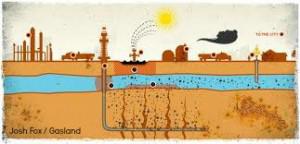Fracking could endanger Karoo water


Hydraulic Fracturing, or “fracking,” is a mining technique in which typically water is mixed with sand and chemicals, and injected at high pressure into rock to create small fractures. These fractures then allow for the extraction of liquids like gas or petroleum.
“Potentially hazardous substances are often added to the fracking fluid or are released through the process,” says Dr Carl Albrecht, CANSA’s head of research.
It is estimated that about 100 of the more than 700 chemicals added to fracking fluid are carcinogenic. These cancer-causing chemicals include benzene, which causes leukemia in children, and formaldehyde, which has been linked to throat and stomach cancers among others. Formaldehyde has also been known to cause drug resistance in bacteria, an issue South Africa is already struggling with in terms of tuberculosis.
Although mining companies are adamant that no spills or leaks will take place that may contaminate underground aquifers, Jonathan Deal with Treasure the Karoo Action Group said there are more than 1 000 cases of contamination in the United States, where fracking has been practiced for more than 50 years. [quote float= left]“Fracking fluid laced with as many as 750 chemicals will need to be disposed of, and there is no clarity on how this will happen”
“Because of the high pressure and depth of operation, it’s not surprising that spills of fracking fluid on the way down or up have been recorded,” Albrecht tells Health-e News. “Fracking fluid laced with as many as 750 chemicals will need to be disposed of, and there is no clarity on how this will happen in the Karoo.”
CANSA has collected and tested samples of Karoo water to estimate its water quality before fracking takes place. If the mining practice is allowed, these baseline samples will be tested against water samples taken post-fracking to determine if water has been polluted.
“This data could be used as evidence in court where a contaminated farm or affected community would need to supply ‘before and after’ samples of drinking water aquifers to prove pollutions,” adds Albrecht.
CANSA is calling for further baseline data to be collected
“It is hoped that this initiative will induce fracking companies to conduct their operations with the greatest of care and protect Karoo plants, animals and humans from any carcinogenic harm through any form of contamination of underground drinking water aquifers,” Albrecht says. – Health-e News.
Author
Republish this article
This work is licensed under a Creative Commons Attribution-NoDerivatives 4.0 International License.
Unless otherwise noted, you can republish our articles for free under a Creative Commons license. Here’s what you need to know:
You have to credit Health-e News. In the byline, we prefer “Author Name, Publication.” At the top of the text of your story, include a line that reads: “This story was originally published by Health-e News.” You must link the word “Health-e News” to the original URL of the story.
You must include all of the links from our story, including our newsletter sign up link.
If you use canonical metadata, please use the Health-e News URL. For more information about canonical metadata, click here.
You can’t edit our material, except to reflect relative changes in time, location and editorial style. (For example, “yesterday” can be changed to “last week”)
You have no rights to sell, license, syndicate, or otherwise represent yourself as the authorized owner of our material to any third parties. This means that you cannot actively publish or submit our work for syndication to third party platforms or apps like Apple News or Google News. Health-e News understands that publishers cannot fully control when certain third parties automatically summarise or crawl content from publishers’ own sites.
You can’t republish our material wholesale, or automatically; you need to select stories to be republished individually.
If you share republished stories on social media, we’d appreciate being tagged in your posts. You can find us on Twitter @HealthENews, Instagram @healthenews, and Facebook Health-e News Service.
You can grab HTML code for our stories easily. Click on the Creative Commons logo on our stories. You’ll find it with the other share buttons.
If you have any other questions, contact info@health-e.org.za.
Fracking could endanger Karoo water
by wilmastassen, Health-e News
January 21, 2015
MOST READ
FS woman waits 4 years for medical negligence pay out after ‘out of court settlement’
Prolonged power outage leaves hospitals in the dark for two days
There’s more to self-care than scented candles or massages, it’s a key public health tool
Access to clean water and stable electricity could go a long way to addressing rising food poisoning in SA
EDITOR'S PICKS
Related


Patents could block access to breast cancer treatment for decades

